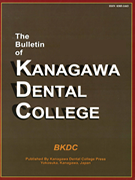- HOME
- > 一般の方
- > バックナンバー:The Bulletin of Kanagawa Dental College
- > 30巻2号
- > アブストラクト
アブストラクト(30巻2号:The Bulletin of Kanagawa Dental College)

English
| Title : | The Masticatory Organ, Brain Function, Stress-release, and a Proposal to Add a New Category to the Taxonomy of the Healing Arts : Occlusion Medicine |
|---|---|
| Subtitle : | BKDC CLINICAL AND RESEARCH TOPICS : Research Topics from the KDC Research Center of Advanced Technology for Craniomandibular Function |
| Authors : | Sadao Sato1, Noriyuki Yuyama2, Katsushi Tamaki3, Norio Hori3, Masaaki Kaneko2, Kenichi Sasaguri1, Masaichi-Chang-il Lee4, Minoru Onozuka5, Rudolf Slavicek6 |
| Authors(kana) : | |
| Organization : | 1Departments of Orthodontics, Kanagawa Dental College, 2Departments of Oral Physiology, Kanagawa Dental College, 3Departments of Prosthodontics, Kanagawa Dental College, 4Departments of Oral Pharmacology, Kanagawa Dental College, 5Department of Anatomy, Gifu University School of Medicine, 6Department of Environmental and Medical Sciences, Center for Interdisciplinary Dentistry, Donau Universitat Krems |
| Journal : | The Bulletin of Kanagawa Dental College |
| Volume : | 30 |
| Number : | 2 |
| Page : | 117-126 |
| Year/Month : | 2002 / 9 |
| Article : | Report |
| Publisher : | Kanagawa Odontological Society |
| Abstract : | The masticatory organ, originally developed as a branchial system, has evolved over a long period of geological time, through a stage in which it was predominantly a tool for expressing aggression, into an organ for emotional management. In humans, the strong grinding and clenching of masticatory muscles known as bruxism plays a role in mitigating stress-induced psychosomatic disorders by down-regulating the limbic system and the hypo-thalamic-pituitary-adrenal (HPA) axis. The health of the masticatory organ depends critically on occlusion, which must be of sufficient quality to successfully carry out its important role of managing stress. Occlusion and the brain must function in harmony. Thus, with an under-standing of the bruxing function of the masticatory organ, practitioners will be better equipped to fully diagnose dental disease and to design effective therapies and treatments to cure those diseases. For these reasons, we must integrate the study of occlusion into the broader scope of medical science; by so doing we will meaningfully advance the state of the art of dental care and general health care. |
| Practice : | Dentistry |
| Keywords : | Stress, Brain, Masticatory organ, Bruxism, Occlusion |
